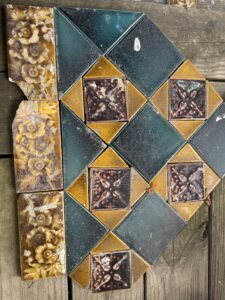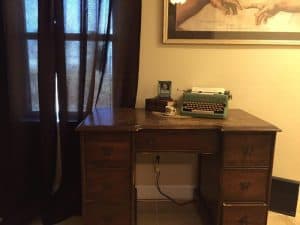Before she passed away, my mom told me I could have my great-grandmother’s desk. It was at my brother’s house for so long that he pointed out that legally he could claim it because of some obscure legal rule about “common law ownership”. But he let me have it back, my dad brought it to Indiana, and it is now at the end of my kitchen, under the print of Michelangelo’s (my apologies for saying da Vinci in my first edition!) hands of God creating Adam. An antique typewriter from one of my friends and a candle from my mom’s funeral are currently on top of it.
For me, the second drawer down on the left-hand side has become my discard drawer for answered prayers. I’ve taken to writing my prayers on note cards recently (at the suggestion of Priscilla Shirer’s book Fervent) and when the prayers have been answered or refined, I drop the card in the drawer.
I called my grandma this morning to ask her if she remembers what my great-grandma Horst used my desk for. She didn’t remember.
I’ve been thinking a lot about prayer lately, and wondering, Why? Why pray? Does it matter? Does it change anything?
On Sunday at church we talked about Abraham begging God to save Sodom, and I got into a friendly argument (with the friend who gave me the antique typewriter) about whether or not Abraham had changed God’s mind. Did the outcome depend on Abraham’s prayers? How did his prayers matter?
A few days later, I read in The Cost of Discipleship by Dietrich Bonhoeffer:
Prayer does not aim at any direct effect on the world; it is addressed to God alone, and is therefore the perfect example of undemonstrative action.
So if Bonhoeffer is right, that prayer is not an effort to change the world, should we bother to do the hard work of interceding for others, and making requests for ourselves?
I asked our pastor Ken over lunch on Sunday about Abraham pleading for his nephew. Did he change God’s mind? Did his prayer matter? He mentioned a verse in Isaiah 59:
The Lord saw it and it displeased him that there was no justice. He saw that there was no man, and wondered that there was no one to intercede.
Even though God could fix the situation on His own, it seems He was disappointed that there was no one to intercede, to beg for His intervention, to be part of the victory. And, Ken reminded me, Moses seems to have changed God’s mind once when He planned to destroy the children of Israel.
So I think maybe God wants us to have such a dependent trust on him that we can, in the name of Jesus, beg Him to act. It is perhaps useless to tell Him how to act, because of course we don’t know what’s best for ourselves, let alone what’s best for other people. But it’s always safe to pray the prayer Jesus taught us to pray: Matthew 6: “Thy will be done on earth as it is in heaven”, both for our own lives and the lives of those around us.
And… I think… sometimes He might act in a way that would not have happened if no one had prayed…don’t you? (I even think my friend who gave me the typewriter might agree.)
Either way, what a beautiful thing to be part of God’s work! Just this morning, I took three note cards out of my stack, and dropped them in the second drawer of my great-grandmother’s desk. One was discarded because of a very distinct answer to prayer for someone else this week. The second was removed from my stack because I feel that God is asking me to claim what I already have in Christ rather than praying in such a way that I convince myself I do not have it. The third one I put in the drawer because over the last few weeks I have felt the answer in my heart and life, even though I didn’t realize it until I looked at the words of the prayer I had written down.
Deeper into his chapter on prayer, Bonhoeffer says,
True prayer does not depend either on the individual or on the whole body of the faithful, but solely upon the knowledge that our heavenly Father knows our needs. That makes God the sole object of our prayers, and frees us from a false confidence in our own prayerful efforts.
God doesn’t need my stash of note cards, or the growing pile in the second drawer of my antique desk. He doesn’t need to be reminded of his own faithfulness.
But I need to be reminded of His faithfulness, because I forget so quickly!
The question is not, Why pray?, but, What would life be like if I could not bring my requests to God? What a thrill to remember that God is my Father, that He does hear, that He knows what I need before I ask, and that he is the Father of every person on my stack. What a relief, that my Father, not my prayer, is the way God’s will advances on earth, as it does in heaven.
Because of Him, I can rejoice every time I drop a card into the drawer.







3 thoughts on “The Second Drawer”
Thank you Katrina for some more good words…I like old things, like old desks and I am fascinated more and more by those who owned and used these old things. Love it!:) But the subject you wrote about is somethings I’ve wondered about too. To think a person can “change God’s mind”? sounds blasphemous right?! But yes, it does seem that at times that it has happened or at least it seems like it is so! Blessings to you this week. ~Sheila
I believe our prayers release God’s power into the situation we are praying about. We need to focus not so much on changing God’s mind (although I believe it does happen) but on releasing His power to accomplish His will on earth as it is in heaven. Our prayers are IMPORTANT!
Thanks for sharing! I think you are right!